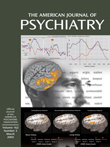Dr. Campbell and Colleagues Reply
To the Editor: Dr. van Elst makes valid points regarding the issue of measuring amygdala volumes in patients with depression. The focus of our analysis was the hippocampus, and therefore, we did not review the literature on amygdala volume measurements independent of the hippocampus in detail. There are several studies focusing exclusively on amygdala volumes, including one examining core amygdala volumes, which recognize not only the difficulty of imaging various nuclei of the amygdala but also the relevance of the fact that there are distinct functional differences between nuclei (1). Perhaps the most intriguing point that Dr. van Elst makes is that medication effects need to be examined in future studies. A recent preliminary report in this Journal(2) suggests that volumetric reduction of the hippocampus may be more a function of time spent ill and untreated than time spent ill and treated. Apart from this report, however, there is little known about the long-term impact of antidepressant or other psychotropic medications on specific brain regions, despite the increasing body of preclinical literature suggesting that some psychotropic medications may have neuroprotective effects and that long-term pharmacotherapy in patients with mood disorders may improve outcome. Harvey and colleagues (3) recently highlighted another important issue regarding medication, that is, the effect of repeated antidepressant withdrawal on brain regions such as the hippocampus. It is also apparent from their review that there are few data to inform us regarding the long-term effects of repeated trials and subsequent withdrawals of antidepressant medications. Despite the current lack of information describing the long-term effects of psychotropic medications on brain morphometry, we fully agree with Dr. van Elst that this is an important area for future study.
1. Sheline YI, Gado MH, Price JL: Amygdala core nuclei volumes are decreased in recurrent major depression. Neuroreport 1998; 9:2023–2028; correction, 9:2436Crossref, Medline, Google Scholar
2. Sheline YI, Gado MH, Kraemer HV: Untreated depression and hippocampal volume loss. Am J Psychiatry 2003; 160:1516–1518Link, Google Scholar
3. Harvey BH, McEwen BS, Stein DJ: Neurobiology of antidepressant withdrawal: implications for the longitudinal outcome of depression. Biol Psychiatry 2003; 54:1105–1117Crossref, Medline, Google Scholar



